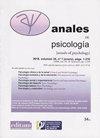西班牙社会科学和心理学领域的创造力研究专题研究
IF 1.3
4区 心理学
Q3 PSYCHOLOGY
引用次数: 0
摘要
在一个机器人在日常生活中日益超越人类的世界里,创造力正成为一项必要的人类技能。为了有效地发展创造力作为一个研究领域,学者们需要知道他们在哪里。我们采用文献计量学方法来研究西班牙创造力研究的主题和特征。结果表明,在过去几十年中,该领域的出版物产量一直在增长。与心理学相比,社会科学中的创造力似乎是一个被低估的、局部的、内生的领域。对于社会科学,过去十年的运动主题是a)儿童和学生在教育环境中的创造力,b)工作环境中的创新和知识创造,以及c)城市和创造力。心理学中的运动主题是a)产生洞察力的个人特征(例如,技能、即兴发挥、执行功能)和b)情商。我们提出了一些未来研究的主题,如虚拟环境中的创造性协作,价值共同创造,以及机器如何帮助人类提高创造力。La creative vidad se estest本文章由计算机程序翻译,如有差异,请以英文原文为准。
A thematic study of creativity research in Spain within the social sciences and psychology
Creativity is becoming one necessary human skill in a world where robots increasingly outperform people in daily routines. In order to efficiently develop creativity as a research field, scholars need to know where they are. We employed a bibliometric approach to study themes and characteristics of creativity research in Spain. The results indicated that publication production in the field has been growing during the last decades. Compared to psychology, creativity in the social sciences seemed to be an undercited, local, and endogamic area. For social sciences, motor themes in the last decade were a) creativity in children and students in the educational environment, b) innovation and knowledge creation in a working environment, and c) cities and creativity. The motor themes in psychology were a) individual characteristics for generating insights (e.g., skills, improvisation, executive functions) and b) emotional intelligence. We suggest some themes for future research, such as creative collaboration in virtual environments, value co-creation, and how machines can help humans boost their creativity.
La creatividad se está convirtiendo en una habilidad necesaria en un mundo donde los robots superan cada vez más a las personas en las rutinas diarias. Para desarrollar eficientemente el campo de investigación de la creatividad, los académicos necesitan saber dónde están. Este artículo utiliza un enfoque bibliométrico para estudiar temas y características de la investigación en creatividad en España. Los resultados indican que la producción ha ido creciendo durante las últimas décadas. En comparación con la psicología, la creatividad en las ciencias sociales parece ser un área poco citada, local y endogámica. Para las ciencias sociales, los temas motores en la última década fueron a) la creatividad en niños y estudiantes en un entorno educativo, b) la innovación y creación de conocimiento en un entorno laboral, y c) las ciudades creativas. Los temas motores en psicología han sido a) las características individuales para generar conocimientos (por ejemplo, habilidades, improvisación, funciones ejecutivas) y b) la inteligencia emocional. Sugerimos algunos temas para futuras investigaciones, como la colaboración creativa en un entorno virtual, la co-creación de valor, y cómo las máquinas pueden ayudar a los humanos a impulsar su creatividad.
求助全文
通过发布文献求助,成功后即可免费获取论文全文。
去求助
来源期刊

Anales De Psicologia
医学-心理学
CiteScore
3.30
自引率
5.90%
发文量
57
审稿时长
4-8 weeks
期刊介绍:
Anales de Psicologia / Annals of Psychology is a multidisciplinary journal of the various thematic areas of scientific psychology. It publishes original research articles and theoretical review in any of its basic, applied and methodological areas included within psychology.
Publishing, financing, marketing and distribution corresponds Editum: Editions of the University of Murcia (Spain). The organizational guidelines and editorial policies come from the Editorial Team (elected for four years by the Areas and / or Departments of Psychology at the University of Murcia) and the Editorial Board, composed of scholars and experts from different universities and institutions national and international. It is published in print (ISSN: 0212-9728) since 1984 and in Internet publishing (web) (ISSN: 1695-2294) since 2000. Available online full text in pdf from the vol. 1 1984.
Anales de Psicologia / Annals of Psychology maintains a system of exchange with other journals and publications of psychology in the world. Through an free exchange agreement with their respective publishers or entities responsible for editing, these journals and publications are received at the University of Murcia (Biblioteca "Luis Vives", near the Faculty of Psychology) and in return, our journal is sent to libraries and educational and research institutions such centers responsible for editing.
 求助内容:
求助内容: 应助结果提醒方式:
应助结果提醒方式:


